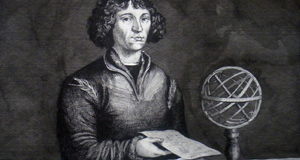Room for DebateDebating the Existence of God: God Exists
By
2014, Vol. 6 No. 03 | pg. 2/2 | « Both of these arguments have the capacity to present great logical conundrums for the existence of a grand design for the universe. If the designer impedes the growth and expansion of its creations, and creates a violent environment the purpose of the being’s creation seems to be its own destruction. However, it is important to examine the truth behind these arguments to determine whether or not they are valid, or common misconceptions. First the violence and war argument will be examined. As stated earlier by Richard Dawkins, it is a common belief that religion has been a major cause of war and death in the world, and continues to be. In the comprehensive “Encyclopedia of Wars” written by Charles Phillips and Allen Axelrod, these two historians compile 1,763 wars and battles in total that have occurred in recorded history. According to the numbers found in the “Encyclopedia of Wars,” of the previously mentioned 1,763 wars only seven percent of them were fought for religious reasons. In terms of casualties caused by wars, the Encyclopedia finds that only two percent of recorded casualties were deaths that occurred during wars fought with religious reasons. What these numbers show is that the argument that refutes the idea of an existence of a higher being based on the violence religion causes is unfounded. The second previously mentioned common argument against a grand designer is the assertion that religion impedes the growth of scientific and technological ingenuity. This argument is pertinent to the assertions made in this essay, because if they are true I have indeed wasted a lot of time and paper. Many of these arguments have their roots in the assumption that religion was a major deterrence of scientific progression in the middle centuries. As mentioned by Author Stephen Pastore earlier, a common argument for the relationship between science and religion during the centuries leading up to the enlightenment eras of the 16-19th centuries is one of hindrance caused by the Church. Atheist writer and philosopher Tim O’Neil actually refutes this claim in his review of the book “God’s Philosophers,” a book that makes the same assertions of the stifling of scientific advancements in the Middle Ages by religion. In this review, O’Neil writes “The assertions collapse as soon as you hit them with hard evidence. I love to totally stump these propagators by asking them to present me with the name of one – just one - scientist burned, persecuted, or oppressed for their science in the Middle Ages.” Later in the review, he challenges the assertion again by saying “they often resort to claiming that the Evil Old Church did such a good job of oppression that everyone was too scared to practice science. By the time I produce a laundry list of Medieval scientists – like Albertus Magnus, Robert Grosseteste, Roger Bacon, John Peckham, Duns Scotus, Thomas Bradwardine, -and ask why these men were happily pursuing science in the Middle Ages without molestation from the Church, my opponents usually scratch their heads in puzzlement at what just went wrong.” (O’Neil.) With this evidence, it seems that the argument that states that religion somehow stifled scientific achievements during the middle ages is more of a misconception than an argument. The number of scientists that thrived and worked during the middle ages is staggering, and the list above only contains some of them. What are the pragmatic implications of this argument? Science and religion have such a dissonant relationship in the 21st century that any attempt to remedy that discordance could be considered a futile effort. By examining specific scientific theories, the intricate nature of our reality, and disproving common arguments used by atheists I hope to restore the relationship that science and religion once had. It seems that within the last half century science has become synonymous with secular thought, and as the chasm between theists and scientists widens we are left with a polarization of two very important perceptions of reality. The purpose of this stance is to assert that as we progress as a society, science yields to us more answers that allude to the idea of design. This newfound mutual exclusivity between theistic arguments and scientific findings proves to be more detrimental to progress than faith alone; which through research has shown in the past to actually foster scientific ingenuity and intellectual enlightenment in past centuries. Renowned author and professor Peter Kreeft states in his article “The Design Argument” that “It is surely up to nonbelievers to produce a credible alternative to design. And "chance" is simply not credible. For we can understand chance only against a background of order.” (Kreeft) As mentioned before for secular scientists and atheists alike their interpretation of the universe is one of chance occurrences, but for one to understand what “chance” looks like you must also understand what order looks like. Kreeft is asserting in his article that since we can only perceive chance by first perceiving the order of our universe, denying the existence of a higher being becomes logically impossible.It seems that now when a person mentions the possibility of intelligent design amongst a group of secular colleagues they are treated the same as the overzealous religious leaders you see on the television that picket funerals and make lewd statements about homosexuals. Intelligent design does not sponsor nor promote any one religion, it does not carry any political implications, it does not limit human rights, nor does it make any social statements. When examining the answers we find through scientific inquiry, it becomes apparent that a deliberate order is present in our universe. Through both empirical practice and rationalistic gathering of data and inference we can observe that the laws of physics exist to promote the most hospitable environment for life. Science shows us that it is highly likely that humans did indeed evolve through a lengthy process of natural selection, but into a cognitive orderly being with a mutualistic symbiotic relationship with the space it occupies. The unfounded disdain for the possibility of intelligent design is rooted in anti-theistic arguments that (as this paper has shown) are often entirely based off of hearsay, not research. Within the realms of objective scientific find you find ample evidence supporting order, design, and deliberate planning within the inner-machinations of our reality. In conclusion, the chasm between science and the idea of an intelligent being responsible for the design of the universe seems to have been created by the secular disdain for “faith-based” arguments. According to the viewpoints of secular philosophers and scientists, the idea of intelligent design is not tangible and cannot be empirically tested. However, their heavy reliance on empiricism and quantifiable data is what prevents them from perceiving the high possibility that the laws of physics and the complexities of the universe warrant a belief in design. When you acknowledge the arguments of a “fine-tuned universe” that has the capacity for supporting life and the symbiotic relationship that human beings have with the planet they occupy, a pattern of order begins to emerge. The argument that a series of coincidences and chance created the universe is based upon a perception of randomness that can only be acquired once you acknowledge the order of the universe. In order to perceive random chance, you must be comparing it to an orderly example. The complex nature of our universe and the rigidity of its laws yields just that: order. Within the realm of scientific knowledge lies ample proof for the existence of a higher being, or a grand designer. Secular philosophers and scientists are tenacious in their attempts to disprove the idea of a God, but in their attempts to disprove they only seem to provide more evidence supporting the existence of a higher being and grand design. ReferencesShapin, Steven. The Scientific Revolution. Chicago, IL: University of Chicago, 1996. Print. Young, Matt, and Taner Edis. Why Intelligent Design Fails : A Scientific Critique Of The New Creationsim [Sic. Creationism] / Edited By Matt Young, Taner Edis. n.p.: New Brunswick, N.J. : Rutgers University Press, c2004., 2004. ST EDWARDS UNIV's Catalog. Web. 11 Dec. 2013. Davies, Paul (2003). "How bio-friendly is the universe". Int.J.Astrobiol 2 (115): 115 Meyer, Stepehen. “Return of the God Hypothesis.” Retrieved 12/11/2013/ arn.org. Journal of interdisciplinary studies. January 1 2011 Schilling, Harold K. Science And Religion. n.p.: Hoboken : Taylor and Francis, 2013., 2013. ST EDWARDS UNIV's Catalog. Web. 11 Dec. 2013. Page, Don N. "A Theological Argument For An Everett Multiverse." (2012): arXiv. Web. 11 Dec. 2013. Dawkins, Richard. “Is Science a Religion?” The Humanist. January 1997. Retrieved 12/11/2013 Pastore, Stephen. “The Tragedy of Religion Stifling Science.” Cape Cod Times. December 8 2011. Retrieved 12/11/13 Phillips, Charles, and Alan Axelrod. Encyclopedia of Wars. New York: Facts on File, 2005 O’Neil, Tim. “The Dark Age Myth: An Atheist Reviews “God’s Philosophers”Armarium Magnum. October 17 2009. Retrieved 12/11/2013 Kreeft, Peter. “Twenty Arguments for the Existence of God: The Design Argument” “The Handbook of Christian Apologetics”peterkreeft.com. 1994. Retrieved 12/11/2013 Suggested Reading from Inquiries Journal
Inquiries Journal provides undergraduate and graduate students around the world a platform for the wide dissemination of academic work over a range of core disciplines. Representing the work of students from hundreds of institutions around the globe, Inquiries Journal's large database of academic articles is completely free. Learn more | Blog | Submit Latest in Opinion |


















